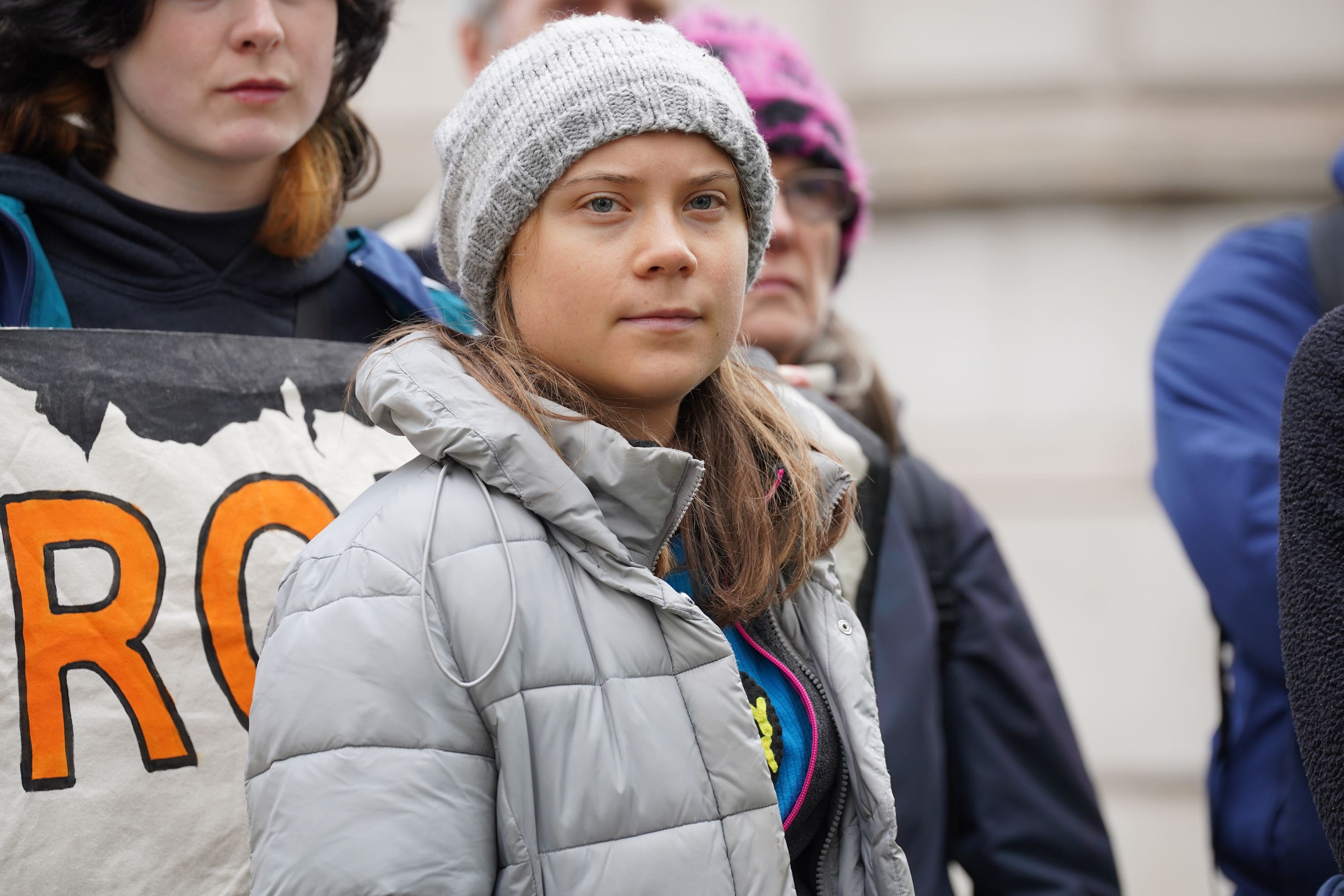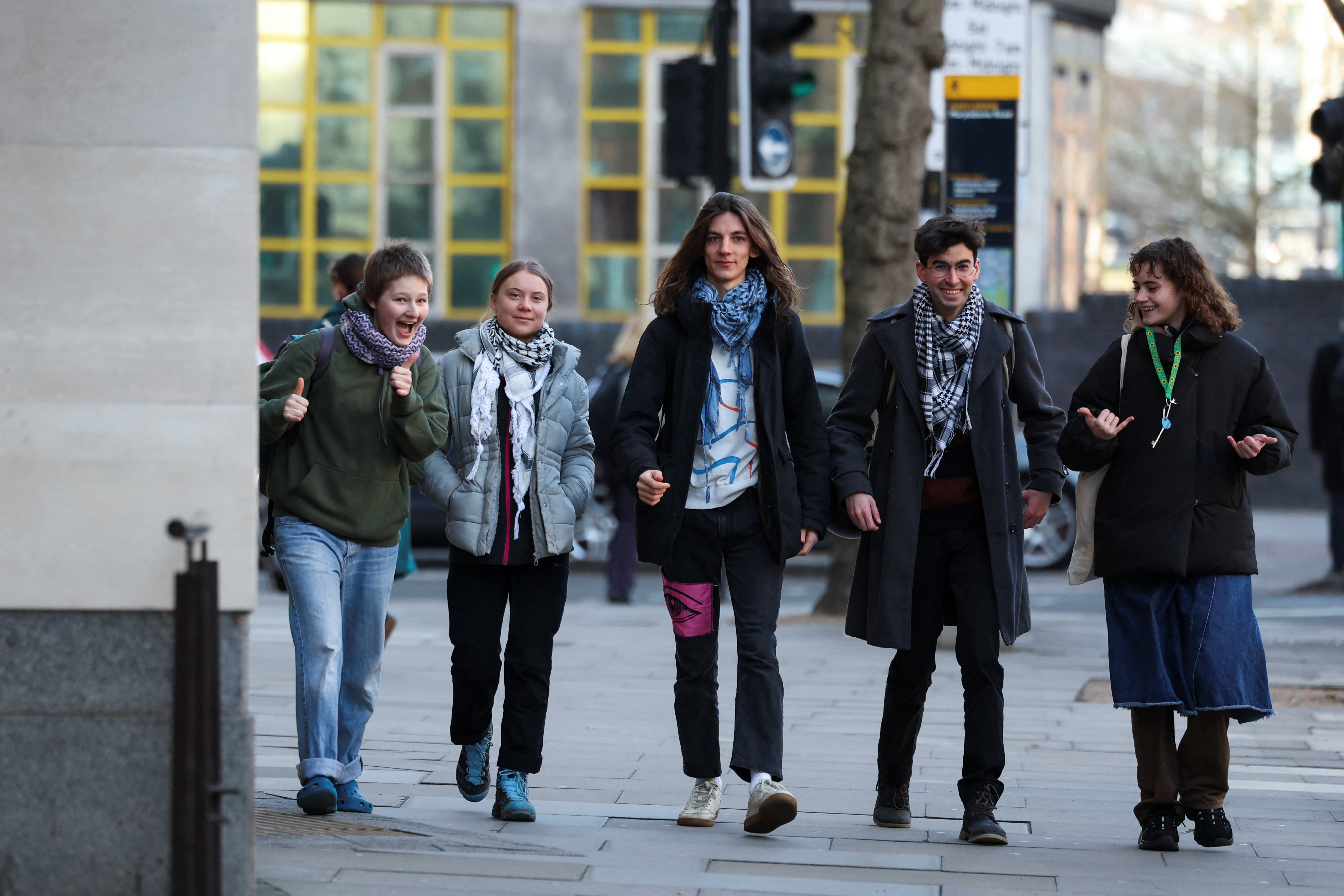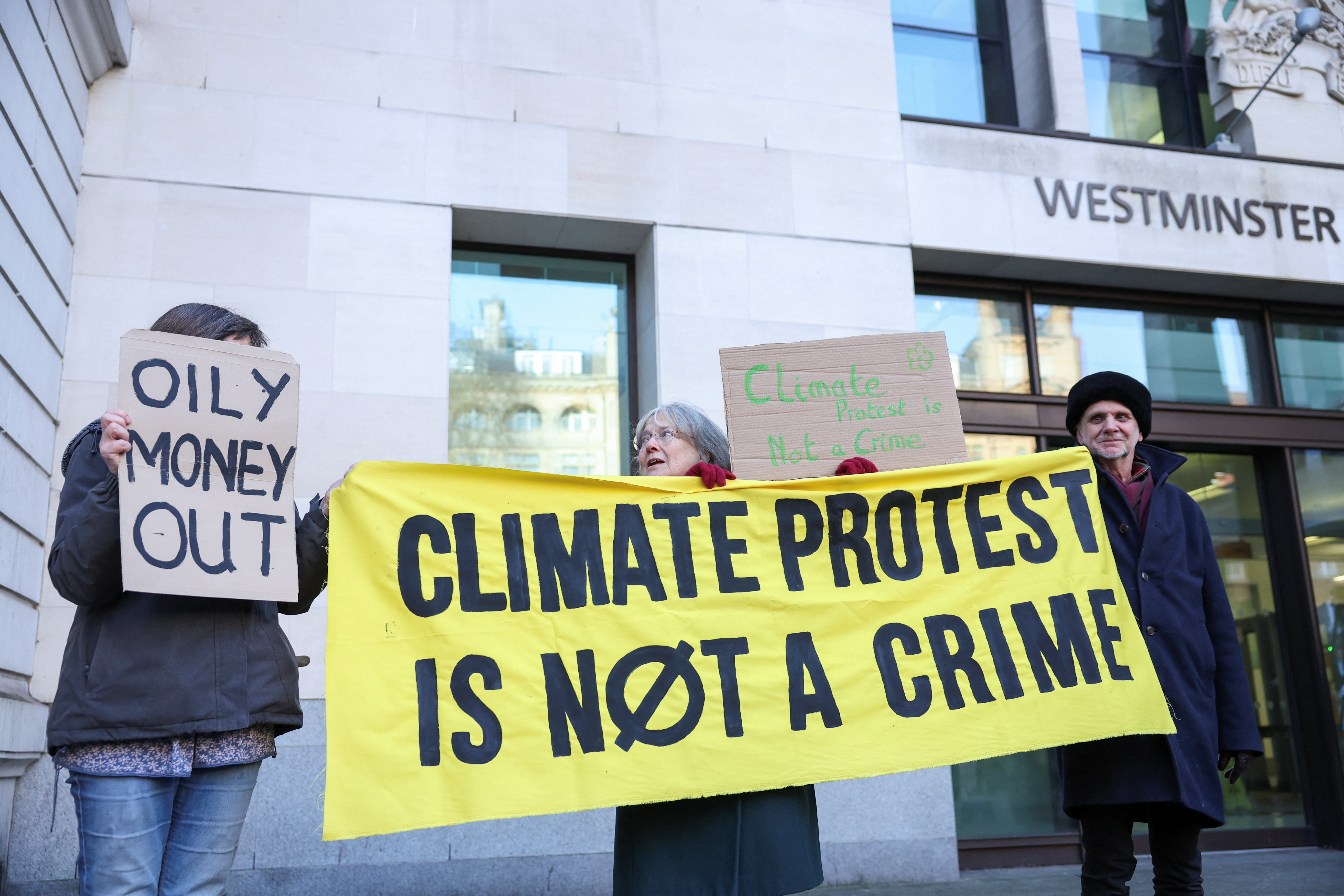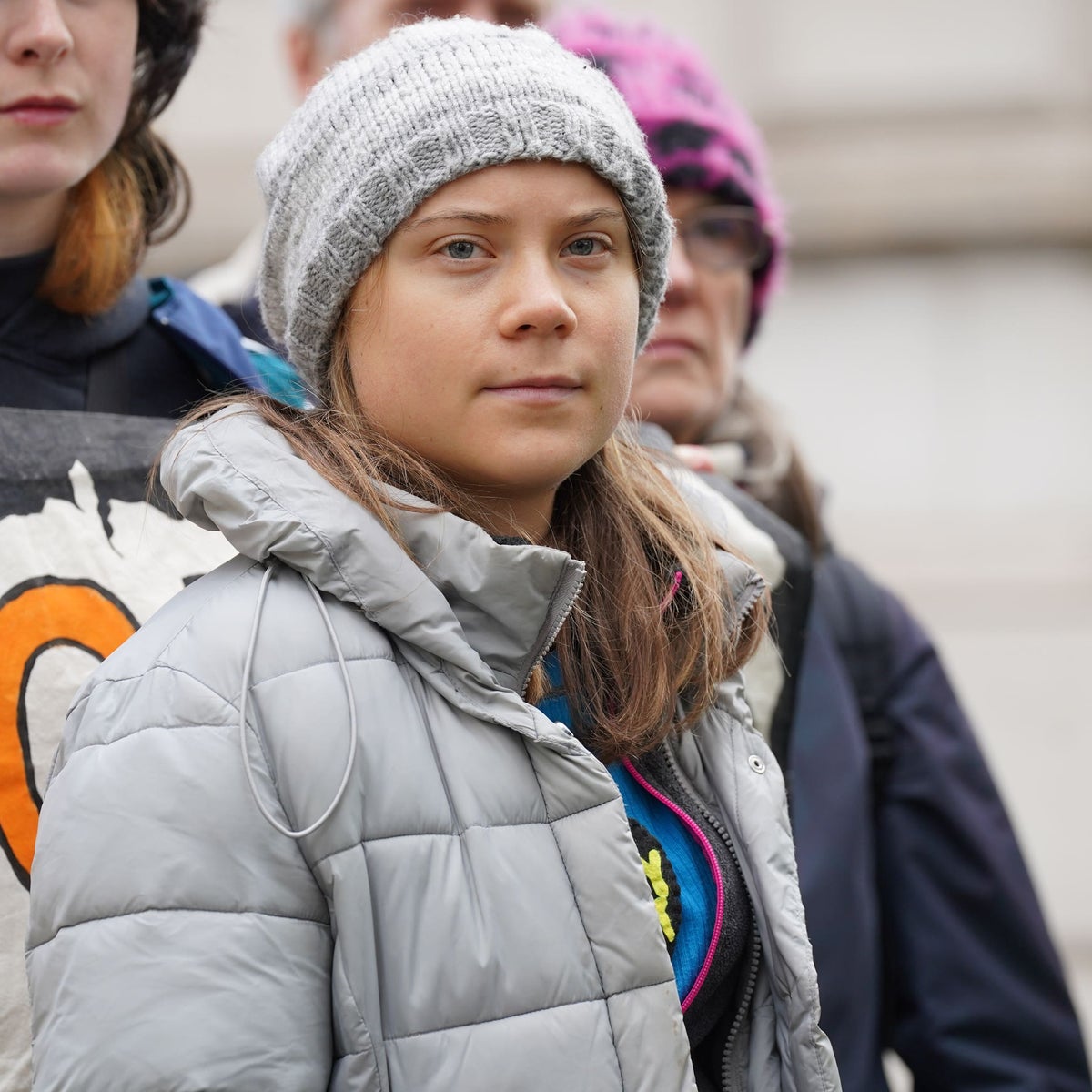Introduction to the Protest and Legal Action

The scene unfolded with palpable tension as climate activist Greta Thunberg appeared before a London court, ready to face the repercussions of her fervent environmental advocacy. Last year, she had taken a definitive stand against the underlying greed and environmental disregard in one of the city's major oil and gas conferences. The echoes of her protest had finally led her to this legal battle.
As Thunberg arrived at the court on Thursday, addressing a public order offence charge, it became clear the stakes were high. Her actions, as always, were rooted in the passionate need to challenge the institutions and mechanisms that continue to put profit before the planet. The oil and gas conference, a symbol of the industrial might that has long fueled the ecological crisis, now became the backdrop for this significant trial.
This confrontation in court was not just about Thunberg or the specific incident outside the conference halls. It was a microcosm of the larger struggle, a testament to the persistent clash between environmental activists and the fossil fuel industry. As the proceedings began, all eyes were fixed upon how the law would interpret acts of civil disobedience when the future of the planet was at stake.
Greta Thunberg's Involvement and Arrest

Greta Thunberg's commitment to environmental activism took a dramatic turn when she was arrested following a protest in central London. The 20-year-old Swedish climate advocate found herself in handcuffs, a stark image underscoring the lengths to which she would go to challenge the status quo. Her participation in the Mayfair oil protest didn't go unnoticed; it sent ripples through activist communities and signaled a fortified stance against fossil fuel reliance.
Upon arrival at the Westminster Magistrates' Court, Thunberg was confronted with the reality of the legal proceedings against her. Charges from her bold action at the oil conference awaited adjudication, highlighting the intersection where peaceful protest meets public order laws. This wasn't simply an activist facing her day in court; it was a personification of the struggle for climate justice being scrutinized under the law.
Her arrest serves as a flashpoint in the narrative of environmental activism, a testament to the lengths to which individuals are willing to go for the earth's future. Moreover, it raises questions about the appropriate response to civil disobedience in the face of global ecological crises. With the world watching, Thunberg's trial was poised to become a landmark case in the history of environmental protest.
Overview of the London Oil Conference and the Charge

The London Oil Conference, a significant assembly for key stakeholders within the fossil fuel industry, became the epicenter of a high-profile protest led by climate activists, including Greta Thunberg. This gathering aimed to reinforce the oil and gas sector's agenda, furthering investments and strategies in a time where urgent climate action is called for globally. It is within this context that Thunberg and others took a stand, to disrupt the narrative of business as usual, demanding accountability and change.
In the course of exercising what many would argue is a democratic right to peaceful protest, Thunberg was arrested for her part in the blockade that interrupted the event on October 17, 2023. The charges, focusing on her alleged obstruction of the conference, are now subject to legal scrutiny at Westminster Magistrates Court. Bringing a youthful face to the forefront of climate justice, the 20-year-old Swedish activist is now confronted with the might of legal systems that serve to protect existing power structures – highlighting starkly the legal versus moral complexities surrounding environmental activism.
The nature of the charge against Thunberg underscores a fundamental clash: the safeguarding of industry interests within the legal framework against the pressing need to address the climate emergency. The outcome of this trial is set to be a bellwether for future environmental protests and the very essence of public demonstration in the struggle against ecological degradation.
The Trial Proceedings

Greta Thunberg faced Westminster Magistrates Court, standing trial for her role in disrupting a major oil and gas industry conference. Without the presence of a jury, a sole judge presided over the case. The proceedings drew attention to pivotal legal and moral questions around the intersection of environmental activism and lawful conduct.
Evidence and key arguments, presented by both the prosecution and the defense, took center stage. The prosecution pushed on the narrative of obstruction, while the defense highlighted the urgency of climate action – portraying Thunberg's actions as conscientious resistance against palpable threats to global ecosystems.
Thunberg, who is scheduled to give evidence on Friday, remains a figure of unwavering resolve in the courtroom. Her testimony is poised to encapsulate her staunch advocacy for the environment, potentially swaying the court's perception of the demonstration's intent and legitimacy.
Observers and participants have noted the weight of the trial's outcome, as it may set a precedent for how environmental protests are treated by the legal system in the UK. The decision reached will not only determine Thunberg's consequences but may also shape the framework for future environmental policies and such forms of public dissent. The conclusion of this trial could redefine the boundaries of what is permissible in the struggle to safeguard the planet's future.
Presentation of Evidence and Key Arguments

In the courtroom, the narratives clashed as the prosecution and defense laid out their evidence and key arguments. The prosecution insisted on labeling the demonstration as an act of obstruction, pointing to the disruption caused at the London Oil Conference. To bolster their case, they meticulously detailed the effects of the protest on the event, emphasizing the participants' deliberate actions to halt proceedings.
The defense, conversely, pivoted the conversation towards the existential threat of climate change. Their argument was clear: actions taken by Greta Thunberg and fellow activists were not mere disruptions but necessary acts of conscience in response to the acute risk posed to the environment. The defense enlisted scientific data on climate perils to reinforce their stance, presenting the protest as a means to compel necessary change rather than a reckless bid for attention.
The crux of the defense strategy underscored the immediate need for action, casting the activists as defenders of public interest, driven to protect the planet for future generations. As the trial unfolded, the exchange between prosecution and defense highlighted the broader debate on taking radical steps to address climate issues, questioning the fine line between lawful dissent and moral duty. The outcome of this trial is anticipated to leave a significant imprint on the legal treatment of environmental protests.
Greta Thunberg's Testimony and Defense Strategy

Greta Thunberg stood firmly, delivering her testimony with the staunch conviction of someone fighting not for their own interest, but for the global community. Her message was unyielding: the protest was not a criminal act but a necessary step to highlight the pressing danger of climate change. She, along with her fellow activists, assumed the role of sentinels, sounding the alarm on an issue that transcends borders and generations.
The defense strategy was tactical, harnessing a blend of moral duty and scientific evidence. They didn't reject the fact that the protest disrupted the oil conference; rather, they presented this disruption as a proportionate response to the far greater disruption climate change wreaks upon lives and ecosystems. Legal representation leaned on factual data, reinforcing the argument that when traditional channels of change neglect to tackle imminent threats, civil disobedience becomes a tool of last resort.
The team channelled the narrative towards the notion of preventing greater harm, shifting the focus from the immediate inconveniences of a protest to the irreversible damage incurred by inaction on climate policy. In the face of a judiciary tasked with interpreting the law, Thunberg's defense highlighted the need for the legal system to evolve with the urgency of contemporary challenges; placing moral urgency over rigid legality.
Public and Media Reaction

The trial of Greta Thunberg has captured public attention, with a visible outpouring of support from environmental activists and concerned citizens alike. Crowds gathered outside the Westminster Magistrates Court, vocalizing their solidarity with Thunberg and the broader climate change movement. The spectacle of support was not just limited to the physical presence of protesters; it extended into the digital realm with a wave of social media backing, emphasizing the shared sense of urgency and collective responsibility to address the climate crisis.
The media found itself at the epicenter of this impactful narrative, with extensive coverage that ranged from sympathetic portrayals of Thunberg as a determined climate warrior to critical depictions of her methods as disruptive. Notably, the media's role in shaping public opinion became evident as different outlets focused on various aspects of the trial. Some emphasized the factual data presented by Thunberg and her defense team, while others highlighted the inconvenience caused to the business event.
The resonance of Thunberg's trial with the public reflects a growing awareness and concern over climate issues. It showcases how powerful the combination of persistent activism and strategic media engagement can be in drawing attention to critical environmental challenges and the demand for urgent policy action.
Public Support and Protester Solidarity

Support for Greta Thunberg surged as she faced legal action, illustrating a stark divide between the authorities' stance on protest suppression and the public's growing frustration towards environmental inaction. The scene outside Westminster Magistrates Court was charged with the collective spirit of comradeship—a sea of protesters, unwavering in their resolve, gathered in solidarity. Signs adorned with bold messages such as "Climate protest is not a crime" and "Who are the real criminals?" reverberated the sentiment that the true transgression lies with those who remain passive in the face of ecological devastation.
This demonstration was more than a singular event; it epitomized a broader movement defying oppressive measures aimed at silencing dissent. The public's rallying cry was unmistakable: the struggle against climate change cannot be criminalized. Amidst a climate of escalating ecological crises, the staunch support for Thunberg and her fellow activists sends a clear message to those in power—that the fight for environmental justice has robust communal backing and will not be subdued by judicial constraints.
The demonstration highlighted the essence of environmental advocacy—a cause that transcends borders and unites diverse individuals under a shared pursuit of a safe and sustainable future. The strength of public support underscores the imperative for genuine policy changes, reflective of the people's demand for a sustainable tomorrow.
Media Coverage and Its Impact on Public Opinion

The trial of Greta Thunberg ignited a media frenzy, casting a spotlight on her activism and the broader issue of environmental protest. Major news outlets from across the globe fixed their cameras on the steps of Westminster Magistrates Court, capturing every moment with an air of anticipation for the outcome of this pivotal case.
Television segments and newspaper headlines beamed Thunberg's image into millions of homes, her steadfast gaze becoming a symbol of youthful defiance against systemic inaction on climate change. Social media, too, played its part, with hashtags and viral threads painting Thunberg as a martyr of the environmental cause.
This media surge shaped public opinion, further polarizing the climate debate. Supporters saw Thunberg as a herald of necessary change, while detractors decried what they perceived as unnecessary disruption. What became clear, however, was that Thunberg's actions and subsequent legal battle had succeeded in reigniting the conversation about the urgency of the climate crisis.
Yet, media outlets failed to dissect the legal nuances at play, often glossing over the implications of the protest on civil liberties. The coverage, while extensive, sometimes missed the fundamental questions about the role of dissent in a healthy democracy and the ever-increasing criminalization of protest.
Environmental Activism and Legal Implications

The intersection of environmental activism and the legal system reflects a tension between urgent ecological concerns and established judicial frameworks. Historically, environmental protests have often resulted in legal consequences, highlighting society's struggle to balance the need for immediate action against climate crisis with the rule of law.
Climate activists, like Greta Thunberg, find themselves facing charges that can range from civil disobedience to more serious allegations, depending on the nature of their protests. The legal outcomes of such actions set precedents that can either empower or deter future demonstrations.
The relationship between climate activism and the legal system is intricate. Protests often spur public discourse and can lead to policy change, yet there is an increasing trend towards the criminalization of protest. This dynamic poses critical questions about the boundaries of lawful assembly and the scope of government authority in regulating environmental advocacy.
Legal implications for activists involve not just the immediate risk of arrest or fines, but the potential for long-term legal repercussions which can impede their ability to mobilize and voice concerns. This reality brings a stark reminder that while the prophetic calls of activists resound, it is within courtroom walls that the permissible limits of their cries for ecological justice are ultimately determined.
Historical Context of Environmental Protests and Legal Outcomes

The intersection of activism and the legal arena is a narrative as old as the environmental movement itself. Time and again, the fervor of grassroots mobilization has crashed against the stringent invulnerability of institutionalized law. From the civil protests of the 60s that ushered in the Clean Air Act to the contemporary climate strikes led by individuals such as Greta Thunberg, the pattern is unmistakable: action begets reaction.
Legal consequences, ranging from simple fines to incarcerations, have been a common aftermath for protestors who dare to defy the norms. The precedents set by these encounters between environmental advocates and judicial systems steer the course of future activism. Often regarded as social upheaval, these protests test the elasticity of legal frameworks, pushing for reformative and more ecologically-sound legislation.
As environmental crises intensify, the judiciary finds itself at a crossroads. The decision to uphold the status quo or pivot towards environmentally-centred jurisprudence could signify a radical shift in the recognition of ecological rights. This delicate balance of enforcing the law while navigating the moral imperative of environmental preservation continues to shape the discourse on civil disobedience and its role in the quest for sustainability. The outcomes of such trials not only influence legal procedures but also ripple through societal norms, shaping perceptions about the role of civil action in the face of ecological adversity.
The Relationship Between Climate Activism and the Legal System

Climate activism has consistently been on a collision course with legal systems worldwide. The recent trial involving Greta Thunberg underscores the deep fissures between civil disobedience and statutory compliance. Environmental crusaders, often spurred by urgent calls for action to address the climate crisis, frequently find themselves at odds with laws designed to maintain public order and protect vested interests.
Judicial institutions harbor the tremendous responsibility of interpreting the legality of protests within the confinement of established norms. Yet, as the climate emergency escalates, courts are compelled to weigh the gravity of ecological considerations against traditional legal boundaries. The growing awareness of climate change implications challenges the rigidity of legal norms, arguing for a reevaluation of what constitutes justifiable civil protest.
Arrests and subsequent trials, such as that of Thunberg's, have the potential to set precedents impacting future demonstrations and may indirectly influence policymaking. Amplified by the media, these cases focus the public's attention on the pressing need for environmental reform, while illuminating the intricate dance between activism and law enforcement.
Ultimately, the interplay between climate activism and legal structures questions the scope of permissible activism and signals the potential for a legal paradigm shift. Curial decisions will indelibly mark the historical trajectory of environmental advocacy and define the limits of active citizen engagement in combating climate dilemmas.
The Verdict and Its Repercussions

The court handed down its verdict, leaving a distinctive mark on the landscape of environmental activism. Greta Thunberg, the climate campaigner, faced the legal consequences of her actions during a protest which put her in direct confrontation with the law. Her arrest, which occurred while she and others were sending a message to oil executives at the Energy Intelligence Forum, ended with a decision that is poised to reverberate within activist circles and beyond.
The implications of this verdict extend to the core of environmental protest strategies. It serves as a fresh reminder that while advocacy is essential, it operates within the parameters set by the prevailing legal frameworks. As a result, activist groups may now need to reassess their tactics, mindful of the potential legal ramifications of civil disobedience.
Furthermore, the judgement could inform future policymaking. It propels the discourse on how to balance the urgent need for climate action with the rights and regulations that govern public assembly and protest. Activists and legal experts alike will be scrutinizing the outcome, seeking insights into the judiciary's stance on environmental protests.
In conclusion, the court's decision constitutes a pivotal moment that could define the intersection of environmental activism and legal boundaries for years to come. It will likely influence both the strategy on the ground and the ongoing conversation about the role of lawful protest in the fight against climate change.
Announcement of the Verdict

In a highly anticipated moment that captured the attention of environmental activists and observers worldwide, the verdict for Greta Thunberg and her fellow defendants was announced by Westminster Magistrates' Court. The Swedish activist, along with two individuals from Greenpeace and two from Fossil Free London, faced charges relating to public order offences following their protest outside a London hotel during the Energy Intelligence Forum in October 2023. Despite their collective plea of not guilty, entered during an initial hearing in November of the previous year, the court rendered its decision on their actions which had defied police orders to disperse.
As the public eagerly awaited outside the courtroom, the judgment echoed through the ranks of those advocating for more radical approaches to environmental issues. The outcome, while not disclosed in the text, is set to have profound effects on the strategy and legal standing of climate protests moving forward. The case, symbolizing the intersection of lawful assembly and the urgency of environmental crisis, drew a line in the sand for future demonstrations and the global climate movement’s fight for policy change. The courts have now spoken, laying down a marker which will help guide the conduct of activists as they balance the merit of their cause with the rigidity of legal frameworks.
Implications for Future Environmental Protests and Policies

The verdict from Greta Thunberg's trial for her participation in the oil and gas conference protest reverberates far beyond the confines of the courtroom. It sets a precedent that could either embolden or discourage future acts of civil disobedience and environmental advocacy.
Environmental activists are now on notice that their actions, no matter how noble their intentions, may meet with stern legal repercussions. This might result in a chilling effect on the willingness of some to participate in demonstrations. On the other hand, the outcome of the trial could also serve as a rallying cry, galvanizing more people to the cause and pushing them towards increased vigilance against environmental injustice.
As for policy implications, the legal system's stance on environmental protests could influence the strategies of advocacy groups. They may need to adjust their tactics to avoid legal pitfalls while still effectively spotlighting urgent environmental issues. Policies that respond to the climate emergency might also face greater scrutiny, as public sympathy for environmental causes is often heightened by the perceived persecution of activists.
In essence, whether the ruling is seen as a deterrent or a catalyst, its impact will be profound, shaping the future of climate activism and policy development.
Conclusion

The trial of Greta Thunberg, stemming from her determined stance against fossil fuel giants at an industry conference in London, underscores the rising tensions between environmental activism and legal boundaries. Thunberg's courage in facing the might of the legal system, alongside her fellow protesters, has brought into sharp focus the enduring struggle for climate justice. The saga of her court appearance is not just an isolated incident but a manifestation of the wider conflict between a younger generation's urgent call for environmental action and the entrenched interests resisting change.
The outcome of this trial, whatever it may be, is set to have far-reaching ramifications on the future of environmental protests and the strategies adopted by campaigners. It presents a pivotal moment for reflection on the role civil disobedience plays in driving forward the climate advocacy narrative. The ripple effects of Thunberg's day in court will undoubtedly influence public discourse and may very well serve to either invigorate a shared global movement for sustainability or trigger a recalibration of tactics to navigate the complex legal landscapes that govern public demonstration.
As the world observes, the message is clear: The fight for a sustainable future is intensifying, with legal frameworks now being tested by the unyielding spirit of climate activism. The determination of Thunberg and her compatriots stands as a testament to the lengths to which individuals are willing to go to safeguard the planet for future generations.
Summary of Greta Thunberg's Day in Court

Greta Thunberg, the relentless Swedish climate activist, faced legal proceedings after her participation in a robust protest against a fossil fuel conference in London. The trial, significant for its scrutiny of activism, brought Thunberg before a magistrate, situating her at the heart of a pivotal moment for both legal interpretation and environmental advocacy.
On the day of the trial, Thunberg's entrance was marked by a sea of media, covering her walk into Westminster Magistrates Court. With the world's eyes firmly on the proceedings, Thunberg and her fellow activists were charged with public order offences, a consequence of their actions during the October 17, 2023, demonstration. The court became an arena wherein the boundaries of lawful protest were contested, an issue reverberating far beyond the walls of the courthouse.
Throughout the trial, Thunberg's presence symbolized the widening rift between the urgency for environmental action and the current legal apparatus. It showcased a trial not only of individuals but of the principles they stood for, resonating with a generation demanding systemic change. As the environment remains under threat, the significance of Thunberg's court appearance echoes the need for a reevaluation of how societies balance the right to protest with the need for pressing climate action. Whether the verdict would serve as a deterrent or a rallying cry for intensified environmental activism was yet to be seen.
Reflection on the Role of Civil Disobedience in Climate Advocacy

The actions of Greta Thunberg and her fellow activists at the oil and gas conference strike at the heart of a much larger dialogue about the role of civil disobedience in climate advocacy. In their demonstration, they embody the frustration and urgency felt by many towards the stagnation in addressing climate change effectively. Civil disobedience has historically been a catalyst for social and political change, and this trial tests its utility in today's environmental struggles.
When traditional avenues for change seem obstructed by interests deeply entrenched in maintaining the status quo, there is a moral impetus for activists to take bolder, non-violent action. Thunberg's choice to confront the powers behind fossil fuel industries directly challenges the dominant paradigm that profits can be prioritized over the planet’s health.
Facing legal repercussions, Thunberg emphasizes that "the real enemy" is the perpetuation of systemic harm against the environment. This reflects not only a passionate plea for ecological preservation but also echoes a broader call for reexamining societal values and legal frameworks in the context of global climate challenges.
As the verdict unfolds and its consequences ripple outwards, it's crucial to recognize that civil disobedience in climate advocacy isn't just about breaking the law for its own sake. It is about demanding greater accountability, inspiring collective action, and awakening political will – all essential components for transformative environmental policy.
Comments
Post a Comment
Thanks for adding to the conversation!